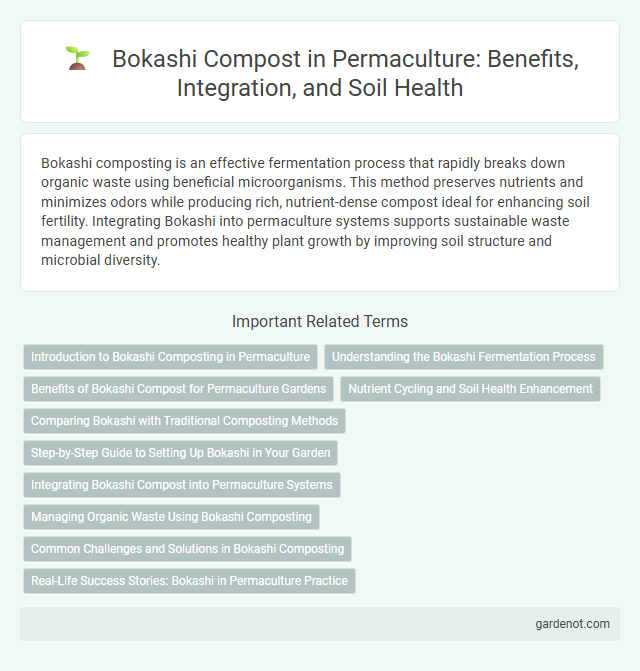Bokashi composting is an effective fermentation process that rapidly breaks down organic waste using beneficial microorganisms. This method preserves nutrients and minimizes odors while producing rich, nutrient-dense compost ideal for enhancing soil fertility. Integrating Bokashi into permaculture systems supports sustainable waste management and promotes healthy plant growth by improving soil structure and microbial diversity.
Introduction to Bokashi Composting in Permaculture
Bokashi composting is an anaerobic fermentation process that rapidly breaks down organic waste using effective microorganisms (EM), making it an efficient soil amendment method in permaculture systems. This technique retains valuable nutrients and enhances soil microbial diversity, improving plant health and productivity. Integrating Bokashi composting in permaculture reduces landfill waste and supports sustainable, closed-loop gardening practices.
Understanding the Bokashi Fermentation Process
Bokashi fermentation relies on anaerobic microbial activity to rapidly break down organic waste into nutrient-rich compost. Effective Bokashi fermentation requires maintaining airtight conditions and regularly adding Bokashi bran, which contains beneficial microbes like lactobacilli, yeast, and photosynthetic bacteria. This process produces a pre-compost that, when buried in soil, accelerates nutrient cycling and promotes healthy plant growth.
Benefits of Bokashi Compost for Permaculture Gardens
Bokashi compost accelerates organic matter decomposition through effective anaerobic fermentation, enriching soil with beneficial microorganisms that enhance nutrient cycling in permaculture gardens. Its ability to break down kitchen scraps rapidly reduces waste while improving soil structure, promoting healthier plant growth and increased microbial diversity. Using Bokashi compost supports sustainable soil fertility management by increasing nitrogen availability and suppressing soil-borne diseases, critical for resilient permaculture ecosystems.
Nutrient Cycling and Soil Health Enhancement
Bokashi compost accelerates nutrient cycling by fermenting organic waste with beneficial microbes, producing nutrient-rich liquid and solids that enhance soil fertility. This process improves soil structure and microbial diversity, promoting healthier root systems and increased nutrient availability. Integrating Bokashi compost into permaculture systems strengthens soil resilience and supports sustainable plant growth.
Comparing Bokashi with Traditional Composting Methods
Bokashi composting accelerates organic waste breakdown through anaerobic fermentation using specific microbes, contrasting with traditional aerobic methods that rely on microbial decomposition exposed to oxygen. Unlike conventional composting, Bokashi processes kitchen scraps, including meat and dairy, in sealed containers without odor, producing nutrient-rich pre-compost ready for soil integration within two weeks. This method enhances soil microbiome diversity, retains more nitrogen, and requires less space and time compared to traditional windrow or pile composting techniques.
Step-by-Step Guide to Setting Up Bokashi in Your Garden
Prepare a Bokashi bin by layering organic kitchen scraps such as vegetable peels and coffee grounds, sprinkling Bokashi bran evenly to introduce beneficial microbes. Compact each layer to minimize air pockets and seal the bin tightly to create an anaerobic environment essential for effective fermentation. After two weeks of fermenting, bury the fermented material in your garden soil to enrich it with nutrients and improve soil microbial activity.
Integrating Bokashi Compost into Permaculture Systems
Integrating Bokashi compost into permaculture systems enhances soil fertility by accelerating organic matter decomposition through effective microbial fermentation. This process produces nutrient-rich bokashi liquid and fermented solids that improve soil structure, promote beneficial microorganisms, and increase plant nutrient availability. Utilizing Bokashi compost reduces waste, supports sustainable nutrient cycling, and complements other permaculture practices such as mulching and crop rotation for resilient ecosystem management.
Managing Organic Waste Using Bokashi Composting
Bokashi composting efficiently manages organic waste by fermenting food scraps using beneficial microbes, accelerating decomposition and reducing odors compared to traditional methods. This anaerobic process retains essential nutrients, resulting in a nutrient-rich soil amendment that enhances soil fertility and plant growth. Implementing Bokashi composting minimizes landfill waste and supports sustainable permaculture practices by converting kitchen waste into valuable biomass.
Common Challenges and Solutions in Bokashi Composting
Bokashi composting often faces challenges such as odor issues due to improper sealing, slow fermentation if temperatures are too low, and contamination from non-organic materials. Solutions include maintaining an airtight container to prevent anaerobic conditions, keeping the fermentation bin in a warm environment between 20-30degC, and strictly using only kitchen scraps without plastic or metals. Regularly draining the Bokashi liquid and ensuring the effective microbial inoculant (EM-1) is fresh also improve decomposition efficiency.
Real-Life Success Stories: Bokashi in Permaculture Practice
Bokashi composting has transformed permaculture farms by accelerating nutrient recycling and improving soil health with minimal odor and space requirements. Real-life success stories highlight its rapid fermentation process, which preserves valuable microbes and organic matter, enabling gardeners to enhance plant growth and yield consistently. Integrating Bokashi into permaculture systems has resulted in robust ecosystems with healthier soil microbiomes and sustainable waste management practices.
Bokashi compost Infographic

 gardenot.com
gardenot.com